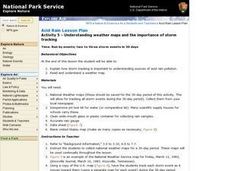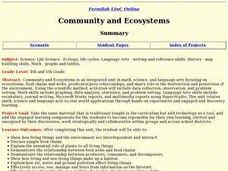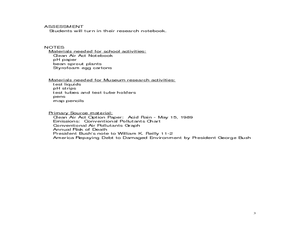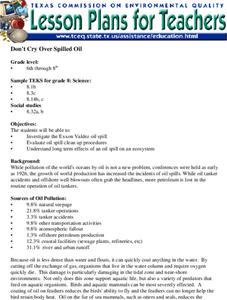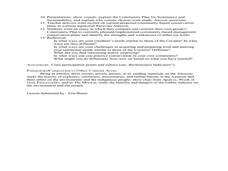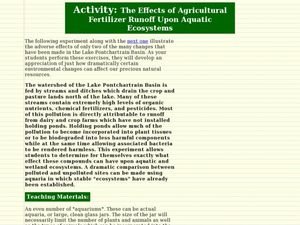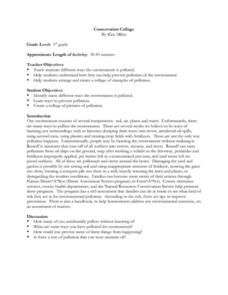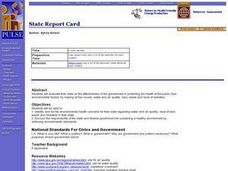Curated OER
Understanding Weather Maps and the Importance of StormT
Young scholars explain how storm tracking is important to understanding sources of acid rain pollution. The read and explain a weather map. They set up plastic or glass collection container for rain in an open area away from buildings...
Curated OER
Rainbow Milk
Students complete activities to learn about rainbows and the importance of dairy in their diet. In this sense and diet lesson, students discuss rainbow colors, the importance of sight, and the importance of dairy in a healthy diet....
Curated OER
White-tailed Deer Issues
Ninth graders examine the white tail deer population in Pennsylvania and explore the impacts that the deer have on the flora and fauna. For this white-tail deer lesson students complete an activity and graph their results.
Curated OER
Community and Ecosystems
Students complete a unit of lessons on ecosystems. They participate in online activities, create a diorama, write journal entries, and develop a Hyperstudio multimedia project on a selected ecosystem.
Michigan Sea Grant
Fish Habitat and Humans
Strict habitat requirements are needed for the survival of fish populations and fish variety in the Great Lakes. Young scientists become experts in the basic needs of fish and understand how survival necessities can vary with different...
Curated OER
Martha Who?
Students explore how the number and types of organisms an ecosystem can support depends on the resources available and on abiotic factors, such as quantities of light and water, a range of temperatures, soil composition. They are...
Curated OER
CLEAN AIR ACT (1990)
Students investigate the effects of acid rain by conducting an experiment with bean sprouts and graph the results. In this Environmental Policy lesson, students visit a museum to identify examples of foreign and domestic policy on...
Curated OER
A Healthy Environment
Students market healthy environments. In this healthy environment lesson plan, students participate in an activity that requires them to examine the food web. Students then research healthy and unhealthy environments and use their...
Curated OER
Don't Cry Over Spilled Oil
Pupils study the Exxon Valdez Oil Spill while evaluating oil spill clean up activities. They discover the long term impact can have on an ecosystem by completing this experiment.
Curated OER
Build Your Own Weather Station
Studens experiment with temperatures. In this science lesson, pupils make their own weather station by heating one bottle and keeping the water in another bottle at room temperature.
Curated OER
Shells
Students participate in an activity that reinforces their skills with subtracting of two-digit numbers. They read in their Math Storybook's about seashells on the beach, hermit crab's and discuss how many they see and where did all the...
Curated OER
Supermarkets, Sustenance and Sustainability
Students investigate jungles and the people who depend upon them. In this sustainability lesson, students research wild life conservation and discover the importance of a jungle to Amazonian people. Students create a group presentation...
Curated OER
Coastal Ecology of the Bahamas
Sixth graders investigate the Bahamas through presentations and charts. In this ecology lesson, 6th graders utilize their library and Internet to research the life forms and species that inhabit the Bahamas. Students observe a...
Curated OER
Report of Shop, Factory, Mill or Industrial Establishment
Students examine the pollution survey created in response to the Public Health Laws of 1903, and compare/contrast polluting factory discharges in 1903 to those allowed today. They analyze the report survey, complete a worksheet, and...
Curated OER
Rainy Day Hike
Students develop awareness about the water cycles. They identify the watershed in which their school is located. They explain the role the schoolyard plays in the watershed.
Curated OER
Solar
Learners study solar energy. For this renewable energy lesson students complete several lab activities using different controls and variables.
Curated OER
The Effects of Agricultural Fertilizer Runoff Upon Aquatic Ecosystems
Students measure the toxic levels of runoff and discuss the effects it would have on the aquatic system. In this runoff lesson plan, students answer questions to how runoff would affect the animals in an aquatic system.
Curated OER
Where's the Point?
Students examine runoff for the causes, the impact, and the solution. In this investigative lesson students construct a three dimensional model of a watershed and provide information of contaminated runoff to their audience.
Curated OER
Conservation Collage
Students identify many different ways the environment is polluted, and determine ways to prevent pollution. They create a collage of pictures describing how the earth becomes polluted.
Curated OER
State Report Card
Twelfth graders evaluate their own state on how well the government protects their citizens from specific health issues. In groups, they list the environmental health concerns regarding water, air, toxic waste and radiation. They...
Curated OER
Journaling
Learners explore journal writing. In this writing activity, students are given writing prompts such as "how the choices I make affect our water quality?" and use critical writing skills to express their feelings in a journal. There are...
Curated OER
Building a Healthy City (Final Project)
Pupils construct a scaled model of a city that provides for the economic and cultural needs of a community while maintaining high quality air and water to protect the public health. They articulate, in a presentation, the locations of...
Curated OER
Introduction to Macroinvertebrates
Third graders investigate the world of macroinvertebrates and identify the environmental stressors that threaten their existence. Outdoors, they role-play as stressors and invertebrates, with the intolerant species doing pushups, spins,...
Curated OER
Chlorine-Bleached Paper
Students analyze the effects of pollution and other types of ecosystem devasation caused by chlorine. They examine alternative technologies that allow for the bleaching of paper without using chlorine. They discover what they can do to...


